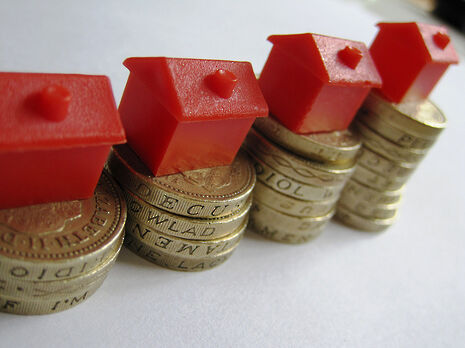Can money really buy you happiness?
When choosing a career, should we only think about what our dream job pays, or are there other important factors? Katherine Ridley uses psychology to explore what really matters

Growing up, I often repeated the naïve maxim “I’m not going to care how much I earn as long as I’m doing a job I love.” Looking back, I realise I was able to say this only from a very privileged standpoint: my family never had to worry about putting food on the table or paying the rent – in fact, growing up abroad my sister and I attended private international schools and travelled widely. I didn’t care about money because I didn’t have to, and if I ever have children, I want the same for them. So my childhood plan of becoming a writer takes backseat as I begin to think more realistically about my future career. But beyond earning enough to live comfortably, does it really matter how much I earn?
An oft-cited 2010 study by Daniel Kahneman and Angus Deaton seems to prove so. Kahneman and Deaton plotted household earnings against well-being. Unlike previous studies on this topic, they distinguished between two types of well-being: emotional well-being (the emotions we experience in our daily lives) and life evaluation (what we think about our life when we sit down and think about it). What they found was that income and education are more closely related to life evaluation, while other factors such as health and loneliness are stronger predictors of emotional well-being.
“Pollan argues that we should treat our jobs merely as money-making methods. We shouldn’t use our jobs to find enjoyment or fulfilment, he argues.”
Citing this study and others of its kind, journalists often quote $75,000 (£61,500) as the cut-off point: up to this level of household income, more money does make you happier; but as soon as you’re earning over $75,000, an increase in salary won’t make you happier. This simplistic interpretation of the study misses a few key details: firstly, Kahneman and Deaton used a logarithmic scale for household income. This is due to something called Weber’s law, or in other words, due to the fact that the effective stimulus for the perception of change is the percentage change, not the absolute change. In layman’s terms: a salary increase of $1,000 will mean a lot more to someone earning $20,000 than someone earning $100,000. Previous studies made the mistake of using a linear scale, making it seem like happiness stops increasing at a certain point, when in fact this was simply because the larger your salary is, the larger an increase in salary you need to make any considerable difference to your life.
What Kahneman and Deaton found is that your life evaluation improves as your household income increases, and continues to improve no matter how large your household income gets. They also found that the more you earn, the better your emotional well-being, but only up to $75,000 – a fairly middle-class income level. These strike me as findings that Stephen Pollan, author of Die Broke, would approve of. In his popular personal finance book, Pollan argues that we should treat our jobs merely as money-making methods. We shouldn’t use our jobs to find enjoyment or fulfilment, he argues. Instead, our jobs should provide the money we need to find those things elsewhere: in our family life, or hobbies, or nice holidays abroad. However, Pollan’s book is now a few decades out of date. Professionals nowadays seem to spend an increasing number of hours in the office – and even when they come home they are expected to check their emails and catch up on reading. If we are spending more time at work, and have less free time in which to spend our hard-earned money, surely it’s important that we enjoy the way in which we’re earning money.
Another factor to consider as well as salary is career progression. This is due to the adaptation phenomenon: while a raise may seem fantastic at first, we soon get used to having more money, and need another raise to get that boost of happiness again. It seems then that our potential to earn more is as important as our starting salaries. Lots of graduate jobs out there offer this: for example, the Civil Service Fast Stream offers a starting salary of £28,000 which could go up to £55,000 after four years.
So, after all my research, what am I looking for in a career? A good life-balance (for my emotional well-being), a salary which would allow me to live a comfortable middle-class life (for my life evaluation), a job with good opportunities for promotions and salary boosts (to deal with that pesky adaptation phenomenon) and a job that I enjoy (as I’ll be committing many hours a week to it). While I have an immense amount of respect and admiration for those who choose to pursue riskier, creative careers, I’ve decided that life path is not for me. While I’m not going to go after a career in banking or consultancy just to bring in the big bucks, I have decided to consider my potential earnings when making career choices, a decision which would truly shock 13-year-old me
 News / Local business in trademark battle with Uni over use of ‘Cambridge’17 January 2026
News / Local business in trademark battle with Uni over use of ‘Cambridge’17 January 2026 Comment / The (Dys)functions of student politics at Cambridge19 January 2026
Comment / The (Dys)functions of student politics at Cambridge19 January 2026 News / Your Party protesters rally against US action in Venezuela19 January 2026
News / Your Party protesters rally against US action in Venezuela19 January 2026 Features / Exploring Cambridge’s past, present, and future18 January 2026
Features / Exploring Cambridge’s past, present, and future18 January 2026 News / Cambridge bus strikes continue into new year16 January 2026
News / Cambridge bus strikes continue into new year16 January 2026







